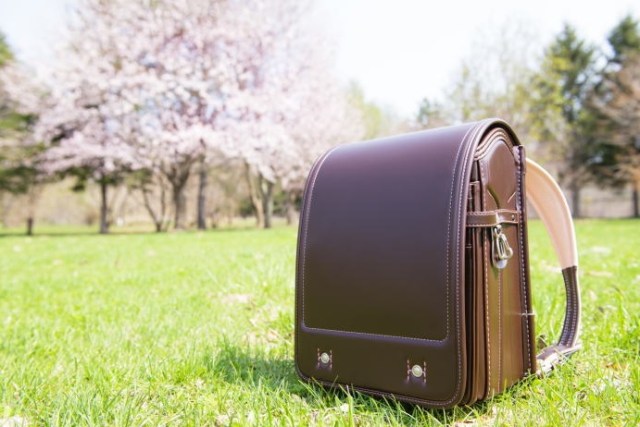
Six years of memories shouldn’t just be tossed away!
You may have heard of the leather, boxy school bag that Japanese elementary school kids use. Called “randoseru” in Japanese, these bags are expensive–sometimes exorbitantly so–but usually made of quality leather to last the whole six years of elementary school. Once students graduate to junior high school, however, they turn in their bulky randoseru for a smaller shoulder bag or backpack.
But for many students and parents, those randoseru hold a lot of memories, and if the leather is still in good condition, it seems a shame to just toss it or shove it away in a closet to be forgotten. That’s why Askal Bag Company, based in Ichinomiya City in Aichi Prefecture, offers a randoseru upcycling service.
The company started in 2010 as a small leatherworking business that specialized in Italian leather and incorporated in 2014. It was three years later when the inspiration to reuse randoseru came, when the daughter of Askal’s President, Daisuke Ohashi, graduated from elementary school to junior high school. She’d learned a friend of hers had turned her randoseru into a mini-bag, so she told her father, “I wish there was a way I could have turned my randoseru into something too.” At the time, they’d already disposed of her randoseru, but Ohashi decided to make her a leather pass case and barette from leather scraps instead. Seeing how happy they made her, Ohashi realized there’s a market for repurposing old randoseru, and so he launched the “Randoseru Remake” service.
The service was immediately popular and steadily gained more and more customers as the years passed. In its first year in 2017, they upcycled 800 bags, but by 2021 that number had jumped as high as 14,000. Business grew exponentially in 2020 because of the coronavirus pandemic, when a lot of sixth graders were suddenly faced with their last days with their randoseru because of school closures. Parents, feeling bad for their children, looked for a service to commemorate their graduation and the bag that saw them through so many years, and word spread like wildfire about Askal.
▼ Pass cases and coin cases made from randoseru
To reuse the randoseru, Askal takes parts of it, like the straps, sides, and belts, and turns them into useful leather accessories of all kinds, including wallets, pass cases, and keychains. The bags are first carefully taken apart using utility scissors that can easily cut through leather, and then the leather of the randoseru is meticulously revived before being repurposed. Depending on how each part is used, the material is thinned, the fuzzy parts burned away, or the pieces are carefully painted by hand.
Even the smallest parts of the randoseru are used, like the embossing on the flap of the backpack or the zipper of the inside pocket, which can both be incorporated into the wallet. Customers have a choice of what items they can receive as well. The basic plan, for example, costs 7,800 yen (US$65) and provides six different items: a key case, a pass case, three barettes, an elliptical keychain, a cord holder, and a belt strap keychain. The 14,500-yen plan includes wallets and other larger accessories.
Askal even offers the option to preserve scratches and damage to the leather, if you so desire, and for a separate fee, you can also have a name or a message engraved, too. They also have a priest from Ichinomiya’s Owari Sarutahiko Shrine purify the leftover pieces and express gratitude for them, so each child’s randoseru and the memories contained in its weathered grains are given all the respect they deserve.
The service is available online through Yahoo! Shopping and Rakuten, so it’s easy to repurpose your child’s beloved randoseru. Whether they’ve been using a plain bag or something really unique, it’s sure to be full of memories, so consider keeping it in a form they can still use!
Source: Tokai TV via Yahoo! Japan News
Top image: Rakuten/Askal Bag Company
Insert images: Rakuten/Askal’s Bag Company (1, 2)
● Want to hear about SoraNews24’s latest articles as soon as they’re published? Follow us on Facebook and Twitter!

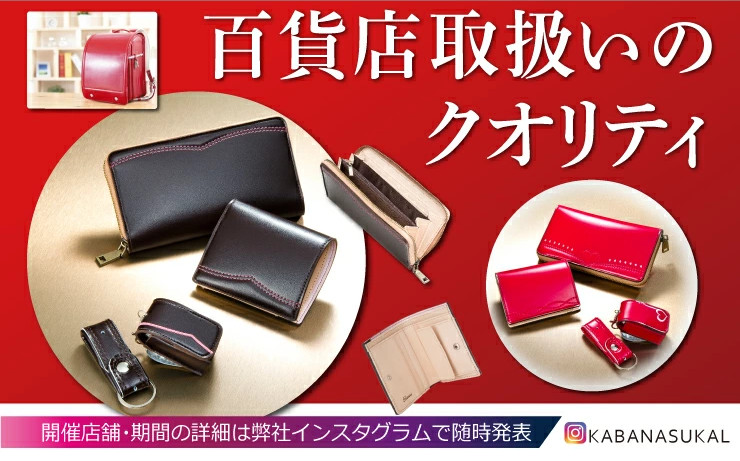
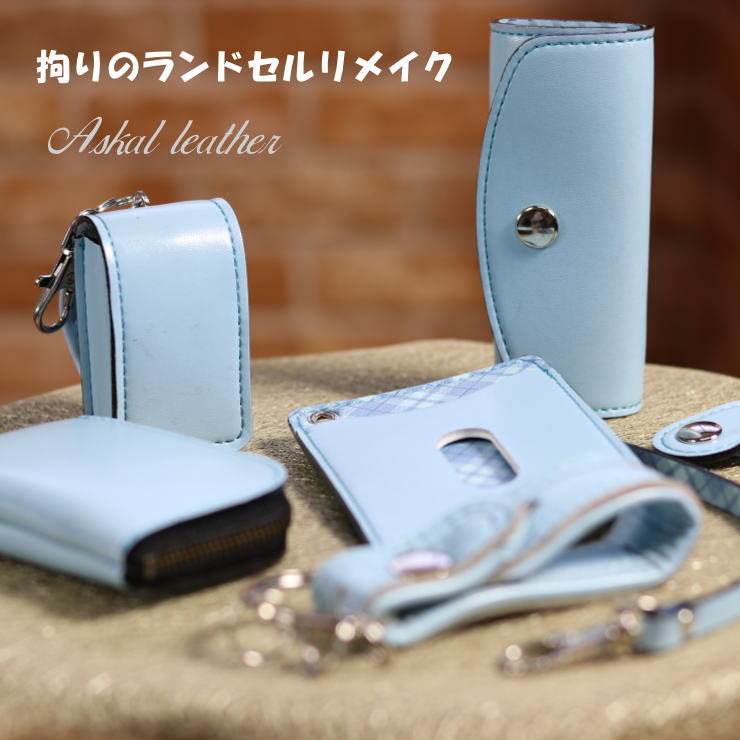
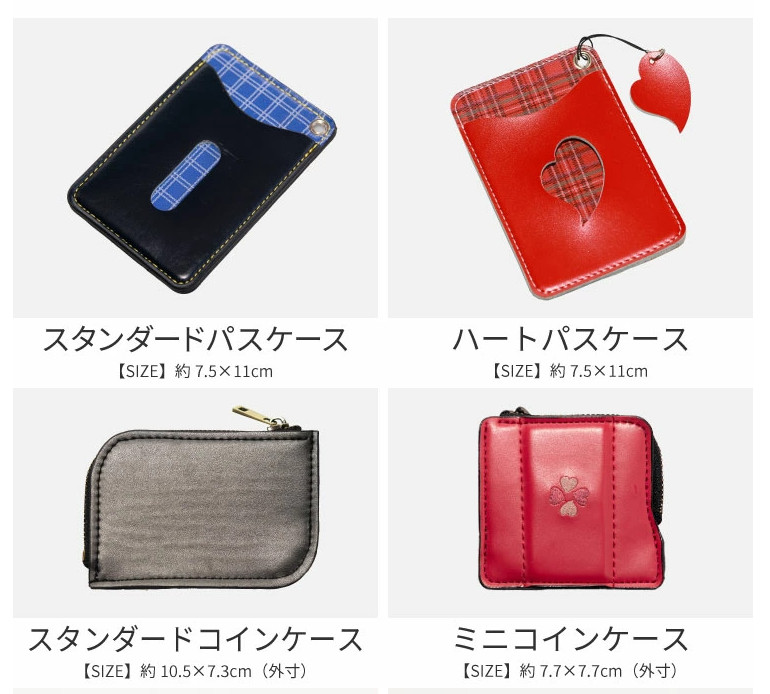
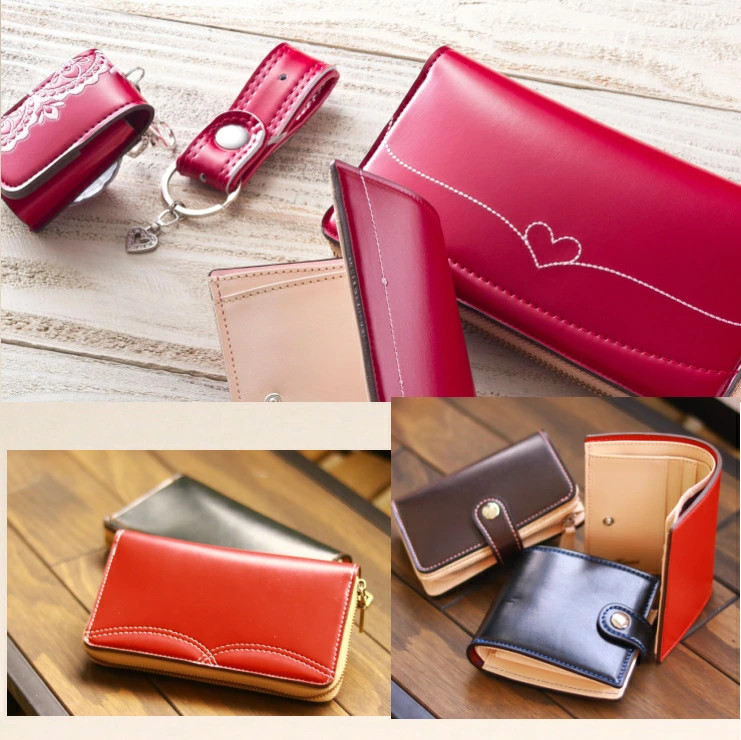
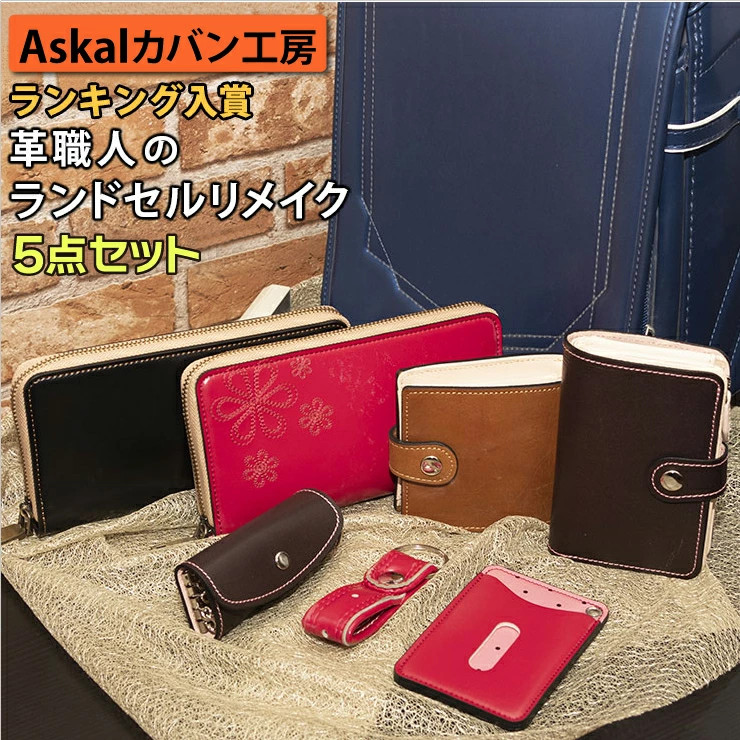
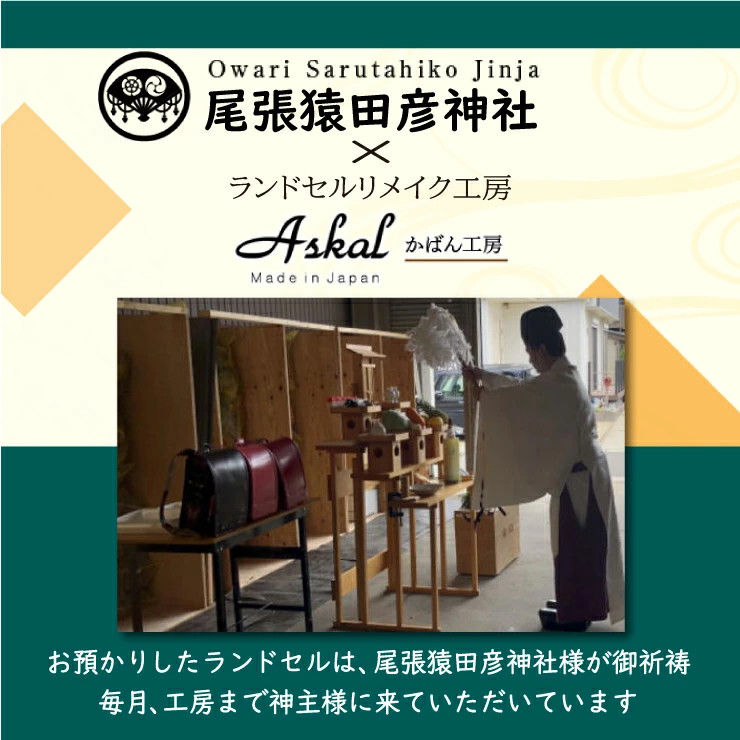
 Japanese elementary school “randoseru” bag brand creates Showa-inspired line for adults
Japanese elementary school “randoseru” bag brand creates Showa-inspired line for adults Children’s “randoseru” backpacks star in Japanese ad campaign with whimsical Victorian vibe
Children’s “randoseru” backpacks star in Japanese ad campaign with whimsical Victorian vibe Japan’s randoseru school backpacks keep getting more expensive, so now parents can rent them
Japan’s randoseru school backpacks keep getting more expensive, so now parents can rent them Japan’s elementary school backpacks grow up with new high-class randoseru for adults
Japan’s elementary school backpacks grow up with new high-class randoseru for adults Japanese schoolkids to be able to carry their books in official Harry Potter randoseru backpacks
Japanese schoolkids to be able to carry their books in official Harry Potter randoseru backpacks Red light district sushi restaurant in Tokyo shows us just how wrong we were about it
Red light district sushi restaurant in Tokyo shows us just how wrong we were about it Sandwiches fit for a sumo served up in Osaka【Taste Test】
Sandwiches fit for a sumo served up in Osaka【Taste Test】 Japanese ramen restaurants under pressure from new yen banknotes
Japanese ramen restaurants under pressure from new yen banknotes Starbucks Japan adds a Motto Frappuccino to the menu for a limited time
Starbucks Japan adds a Motto Frappuccino to the menu for a limited time McDonald’s new Happy Meals offer up cute and practical Sanrio lifestyle goods
McDonald’s new Happy Meals offer up cute and practical Sanrio lifestyle goods Akihabara pop-up shop sells goods made by Japanese prison inmates
Akihabara pop-up shop sells goods made by Japanese prison inmates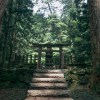 Mt. Koya planning to instate visitor’s tax to cope with huge tourist numbers
Mt. Koya planning to instate visitor’s tax to cope with huge tourist numbers Anime girl English teacher Ellen-sensei becomes VTuber/VVTUber and NFT
Anime girl English teacher Ellen-sensei becomes VTuber/VVTUber and NFT French Fries Bread in Tokyo’s Shibuya becomes a hit on social media
French Fries Bread in Tokyo’s Shibuya becomes a hit on social media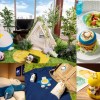 Pokémon Sleep camping suite and guestrooms coming to Tokyo Hyatt along with giant Snorlax burgers
Pokémon Sleep camping suite and guestrooms coming to Tokyo Hyatt along with giant Snorlax burgers All-you-can-drink Starbucks and amazing views part of Tokyo’s new 170 meter-high sky lounge
All-you-can-drink Starbucks and amazing views part of Tokyo’s new 170 meter-high sky lounge More foreign tourists than ever before in history visited Japan last month
More foreign tourists than ever before in history visited Japan last month Studio Ghibli releases new action figures featuring Nausicaä of the Valley of the Wind characters
Studio Ghibli releases new action figures featuring Nausicaä of the Valley of the Wind characters New private rooms on Tokaido Shinkansen change the way we travel from Tokyo to Kyoto
New private rooms on Tokaido Shinkansen change the way we travel from Tokyo to Kyoto Starbucks reopens at Shibuya Scramble Crossing with new look and design concept
Starbucks reopens at Shibuya Scramble Crossing with new look and design concept Studio Ghibli glasses cases let anime characters keep an eye on your spectacles
Studio Ghibli glasses cases let anime characters keep an eye on your spectacles Beautiful Ghibli sealing wax kits let you create accessories and elegant letter decorations【Pics】
Beautiful Ghibli sealing wax kits let you create accessories and elegant letter decorations【Pics】 Studio Ghibli releases Kiki’s Delivery Service chocolate cake pouches in Japan
Studio Ghibli releases Kiki’s Delivery Service chocolate cake pouches in Japan New definition of “Japanese whiskey” goes into effect to prevent fakes from fooling overseas buyers
New definition of “Japanese whiskey” goes into effect to prevent fakes from fooling overseas buyers Our Japanese reporter visits Costco in the U.S., finds super American and very Japanese things
Our Japanese reporter visits Costco in the U.S., finds super American and very Japanese things Studio Ghibli unveils Mother’s Day gift set that captures the love in My Neighbour Totoro
Studio Ghibli unveils Mother’s Day gift set that captures the love in My Neighbour Totoro New Japanese KitKat flavour stars Sanrio characters, including Hello Kitty
New Japanese KitKat flavour stars Sanrio characters, including Hello Kitty New Pokémon cakes let you eat your way through Pikachu and all the Eevee evolutions
New Pokémon cakes let you eat your way through Pikachu and all the Eevee evolutions Disney princesses get official manga makeovers for Manga Princess Cafe opening in Tokyo
Disney princesses get official manga makeovers for Manga Princess Cafe opening in Tokyo Sales of Japan’s most convenient train ticket/shopping payment cards suspended indefinitely
Sales of Japan’s most convenient train ticket/shopping payment cards suspended indefinitely Sold-out Studio Ghibli desktop humidifiers are back so Totoro can help you through the dry season
Sold-out Studio Ghibli desktop humidifiers are back so Totoro can help you through the dry season Japanese government to make first change to romanization spelling rules since the 1950s
Japanese government to make first change to romanization spelling rules since the 1950s Ghibli founders Toshio Suzuki and Hayao Miyazaki contribute to Japanese whisky Totoro label design
Ghibli founders Toshio Suzuki and Hayao Miyazaki contribute to Japanese whisky Totoro label design Doraemon found buried at sea as scene from 1993 anime becomes real life【Photos】
Doraemon found buried at sea as scene from 1993 anime becomes real life【Photos】 Tokyo’s most famous Starbucks is closed
Tokyo’s most famous Starbucks is closed One Piece characters’ nationalities revealed, but fans have mixed opinions
One Piece characters’ nationalities revealed, but fans have mixed opinions We asked a Uniqlo employee what four things we should buy and their suggestions didn’t disappoint
We asked a Uniqlo employee what four things we should buy and their suggestions didn’t disappoint Princesses, fruits, and blacksmiths: Study reveals the 30 most unusual family names in Japan
Princesses, fruits, and blacksmiths: Study reveals the 30 most unusual family names in Japan Japanese school bag collaborates with a limited express train company for one awesome bag
Japanese school bag collaborates with a limited express train company for one awesome bag This nonconformist Japanese schoolgirl is ready for any bullies who tease her about her backpack
This nonconformist Japanese schoolgirl is ready for any bullies who tease her about her backpack Beautiful bag designed by leather craftsman specially for carrying watermelons is a work of art
Beautiful bag designed by leather craftsman specially for carrying watermelons is a work of art Lexus creates $1,350 luxury randoseru Japanese backpack with material from its iconic sports car
Lexus creates $1,350 luxury randoseru Japanese backpack with material from its iconic sports car Cuteness goes beyond death in Japan with super-cute memorial urns【Photos】
Cuteness goes beyond death in Japan with super-cute memorial urns【Photos】 Japanese bag maker creates demon-slaying bag based on five-year-old’s sketch
Japanese bag maker creates demon-slaying bag based on five-year-old’s sketch Store your captured cards and other belongings in these Cardcaptor Sakura handbags
Store your captured cards and other belongings in these Cardcaptor Sakura handbags Starbucks teams up with Japanese clothing brand to create stylish new contactless payment system
Starbucks teams up with Japanese clothing brand to create stylish new contactless payment system Have giant cookies, cakes, drinks, and wearable baby heads at the Kids’ Perspective Exhibition
Have giant cookies, cakes, drinks, and wearable baby heads at the Kids’ Perspective Exhibition Hello Kitty and AKB48 collaborate for the ultimate fan merchandise from Thank You Mart
Hello Kitty and AKB48 collaborate for the ultimate fan merchandise from Thank You Mart Protect your cards and cash with the adorable cat-eared Sailor Moon Luna Leather Collection
Protect your cards and cash with the adorable cat-eared Sailor Moon Luna Leather Collection Giant wearable baby head, huge randoseru backpack part of empathy-boosting art exhibit in Japan
Giant wearable baby head, huge randoseru backpack part of empathy-boosting art exhibit in Japan New Sailor Moon collaboration goods from Baby-G and Samantha Vega feature gorgeous details
New Sailor Moon collaboration goods from Baby-G and Samantha Vega feature gorgeous details Luxury Spanish leather designer Loewe releases limited edition My Neighbor Totoro collection
Luxury Spanish leather designer Loewe releases limited edition My Neighbor Totoro collection Take a trip in the name of the moon with Sailor Moon travel cases, bags and passport wallets
Take a trip in the name of the moon with Sailor Moon travel cases, bags and passport wallets
Leave a Reply